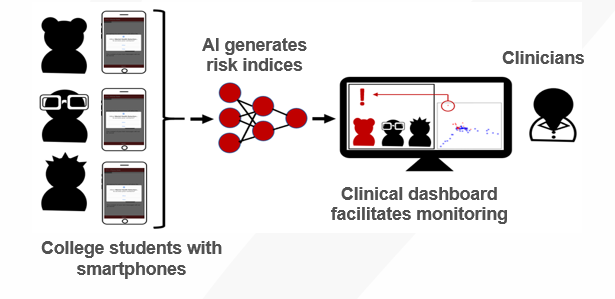LEMURS
Co-Leads: Katie Dixon-Gordon, Elke Rundensteiner
Leveraging Early Mental Health Uncovering Risk for Suicide (LEMURS) expands a smartphone app that uses passive smartphone data to derive a suicide risk index, and couples it with an iteratively co-designed clinician facing dashboard and processes to streamline suicide risk screening in college campuses.

This project, Leveraging Early Mental Health Uncovering Risk for Suicide (LEMURS), extends our work on EMU, which uses passively-obtained data from participants’ smartphones to screen for distress and suicide ideation and extends this to LEMURS which will activate risk alerts in health provider-facing dashboards, and applies implementation science principles for integration and uptake in college health centers. The project has several aims to: (1) understand stakeholder needs and concerns for this technology via interviews with students, clinicians, and staff; (2) co-develop a provider-facing dashboard responsive to student preferences and clinician workflow needs via iterative interviews and prototype evaluations; (3) explore how LEMURS can integrate with suicide risk interventions; and (4) evaluate feasibility/barriers by deploying LEMURS in a college healthcare setting in 40 students (n=20 with high suicide risk) alongside daily surveys evaluating self-reported suicide risk. This project will explore system, clinician, and patient influences on implementation. The goal of this study is to streamline universal suicide risk screening and monitoring of college campuses plagued by a high rate of onset of suicidal thoughts/behaviors. Accelerated translation of LEMURS for suicide risk screening adoption in college health settings has the potential to ease the burden on health systems and reach thousands of at-risk students annually.
Additional information about LEMURS is available on NIH RePORTER.